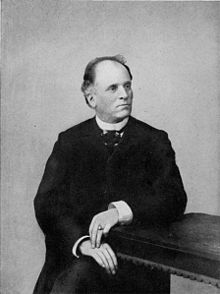Adolph Bandelier
| Adolph Francis Alphonse Bandelier | |
|---|---|
 |
|
| Born | August 6, 1840 Bern, Switzerland |
| Died | March 18, 1914 (aged 73) Sevilla, Spain |
| Residence |
Switzerland United States |
| Nationality | American |
| Fields | Archaeology |
Adolph Francis Alphonse Bandelier (August 6, 1840 – March 18, 1914) was a Swiss-born American archaeologist who particularly explored the indigenous cultures of the American Southwest, Mexico and South America. He immigrated to the United States with his family as a youth and made his life there, abandoning the family business to study in the new fields of archeology and ethnology.
Bandelier National Monument in New Mexico, was named for him, as his studies established the significance of this area in the Jemez Mountains for archeological and historic preservation of sites of Ancestral Puebloans, dating to two eras from 1150 to 1600 CE.
Bandelier was born in Bern, Switzerland. As a youth, he emigrated to the United States with his family, which settled in Highland, Illinois, a community established by other Swiss immigrants. He labored unhappily in the family business as a young man. He became acquainted with the pioneering anthropologist Lewis Henry Morgan of New York, who served as his mentor as Bandelier turned to scholarship. In particular, he undertook archaeological and ethnological work among the Native Americans of the southwestern United States, Mexico and South America.
Beginning his studies in Sonora (Mexico), Arizona and New Mexico, Bandelier developed as the leading authority on the history of this region. With F. H. Cushing and his successors, he became one of the leading authorities on its prehistoric civilization, at a time when archeology and ethnology were new fields of study.
...
Wikipedia
